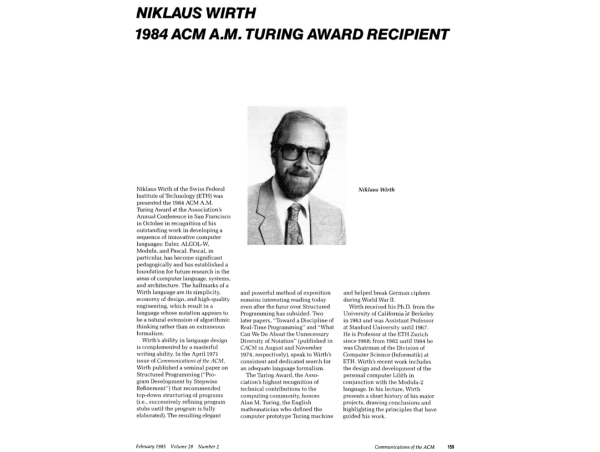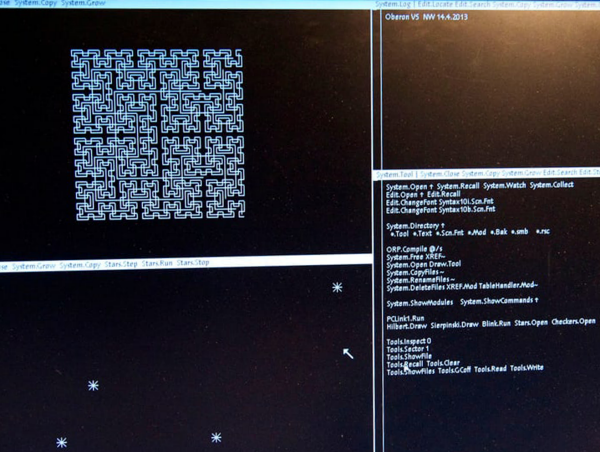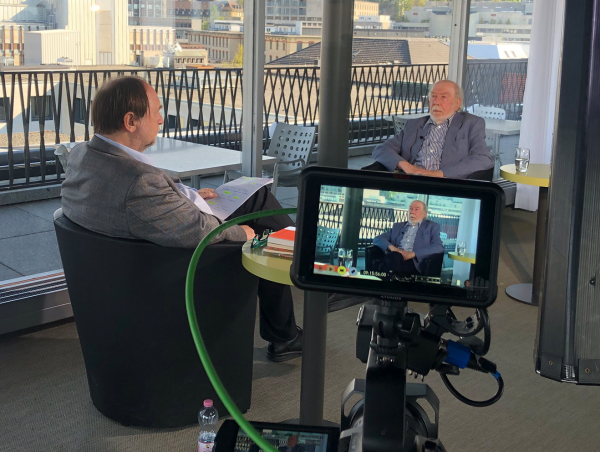"You can't invent everything perfectly from the start" - Part 3/3
In the last part of this video series, Niklaus Wirth tells us what doors the Turing Award opened for him and how he got one step closer to perfection with each programming language.
Video series: Part 3/3
1984: Apple introduces the Macintosh, IBM introduces its IBM Personal Computer/AT and the Swiss computer scientist Niklaus Wirth is awarded the Turing Award — the highest prize in the field of computer science.
In the third part of this video conversation, Prof. em. Niklaus Wirth and Prof. em. Friedemann Mattern talk about this special award and what exciting opportunities it has brought for the researcher and visionary. The prestigious prize was awarded to Wirth for the development of several programming languages including Euler, Algol W, Modula and especially Pascal. In this interview, the professor emeritus recounts how this gave him the opportunity for lecture tours abroad, allowing him to efficiently advance his research.
However, Niklaus Wirth was never one to rest on his laurels — on the contrary. The further development and optimisation of his programming languages was a lifelong project of Wirth. What started with Euler, finally ended with Oberon: a language with the object oriented concept and type hierarchy, which should be as powerful as possible but at the same time as simple as possible. Because Niklaus Wirth wanted to invent something for the general public, completely in the sense of the principle of economy and comprehensibility.
"I pursued a lifelong goal of developing a language that was as powerful as possible, but at the same time as simple as possible. Oberon is the last link in this development chain."Niklaus Wirth
Oberon did not remain just a language. It became a whole system, and in the end, appropriately enough, the book "Project Oberon" was published, in which software, language and, more recently, hardware are described in about 500 pages — the pride and joy of his work, as Niklaus Wirth emphasises in the interview.
In this sequel, Wirth's personality is illuminated from different angles. We get to know a person who was not only a researcher, but also a dedicated teacher who wanted to make computer science accessible to society.

Niklaus Wirth was a professor at ETH Zurich from 1968 to 1999. He was a leading force in establishing the department and the study programme of computer science. He received his diploma in electrical engineering from ETH Zurich, followed by a Master's degree from the Université Laval in Canada in 1960. In 1963, he received his doctorate from the University of California, Berkeley, where he worked with Harry Huskey on the generalisation of the programming language Algol 60. After assistant professorships at Stanford University and the University of Zurich, he returned to ETH in 1968, initially as Professor of Computer Science, where he taught and conducted research until 1999. In the years 1976 to 1977 and 1984 to 1985, study visits were made to Xerox's Palo Alto Research Center (PARC).
During 31 years at ETH Zurich, Niklaus Wirth developed new programming languages (Euler, PL360, Algol W, Pascal, Modula, Modula 2, Oberon, LoLa), built the first personal computers (PCs) in Switzerland, trained a first generation of Swiss computer scientists and wrote several standard works that have been translated worldwide. He received numerous honors, including the prestigious ACM Turing Award in 1984 as the first and so far only German-speaking computer scientist and the IEEE Computer Pioneer Award in 1988.
Friedemann Mattern was full professor at the Department of Computer Science from 1999 to 2020. He led the Distributed Systems Group and established ubiquitous computing as a research area at ETH Zurich. From 2010 to 2013 he was head of the department. At the Department of Computer Science, Mattern taught courses on distributed systems and algorithms, networks, ubiquitous computing, and smart energy. His lecture Informatik II for electrical engineers was part of the initiative "Critical Thinking ETH", which promotes interdisciplinary exchange, critical thinking and responsible action.
Friedemann Mattern is a member of the editorial board of several scientific journals and has published over 180 research articles. He is also a member of several scientific academies such as the German Academy of Sciences (Leopoldina) and of acatech, the German Academy of Science and Engineering.



Mentions from the video
- external page ALGOL (programming languages)
- external page C (programming language)
- external page Cedar (programming language)
- external page Ceres (workstation)
- external page Eiffel (programming language)
- external page Emitter-coupled logic
- external page Fortran (programming language)
- external page Semiconductor device fabrication
- external page Java (programming language)
- external page Covariance and contravariance
- external page Lilith (computer)
- external page Mesa (programming language)
- external page Modula (programming language)
- external page Oberon (programming language)
- external page Object-oriented programming
- external page Pascal (programming language)
- external page Xerox Alto
40 years D-INFK
The study programme and the Department of Computer Science at ETH Zurich are celebrating their fortieth anniversary this year. On this occasion, a series of interviews with former professors of the department, who were leading forces in the foundation and development of D-INFK, was created.